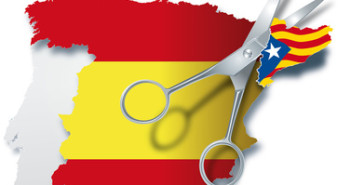From a speck on the political calendar, the crisis in Catalonia has taken center-stage on the global scene. Spanish stocks suffered heightened volatility, bond yields rose and also the euro has reacted.Â
We are now approaching a highly anticipated speech from Carles Puigdemont, Catalonia’s president. The big question is: will he declare independence unilaterally (DUI as it is known in Spanish)? He is under pressure to drop it, but what exactly will he do?
The controversial referendum on October 1st resulted in a victory for independence but a with a low turnout as well as brute-force crackdown from the Spanish government. Since then, there have been many speeches, massive demonstrations on both sides and also an exit of major companies out of Catalonia.
Here are three scenarios for this colossal event for Catalonia, Spain and also for Europe.
The Good – defusing the situation
Puigdemont and Spanish PM Rajoy reach a deal to defuse the situation. This could include a commitment from Catalonia to refrain from a DUI and from the government to refrain from suspending the autonomy (Article 155 of the Spanish constitution). A second and immediate step would be to create an independent committee that would dive into the grievances of Catalans which include the fiscal deficit and the cultural identity.
Avoiding any big steps and taking the time to talk about the problems would calm tensions for mainstream Catalans and Spaniards, leaving only the extremists frustrated.
For markets, it could result in a surge of Spanish stocks, a drop in yields and a minor bump up in the euro, which is not pricing in a disaster.
This scenario has a medium probability: While there are signs that Puigdemont could climb down, the Spanish government has rejected negotiations. On the other hand, there are many attempts to mediate, so maybe something is going on behind the scenes.
The Bad – declaration of independence
A unilateral declaration of independence has no immediate consequences: Catalonia does not have an army, nor a currency. The local government does not even control its bank accounts. However, it would be a political earthquake.
Ghosts from the Spanish Civil War of the late 30s could be seen. While the Catalan independence movement has been a pacifist one, such a rupture could get people scared of violence.
Spain would likely respond by suspending the Catalan autonomy and rule Catalonia directly. More firms will leave the northeastern region, and Spanish stocks will crash. Bond yields of Catalonia could leap while those of Spain could rise quite significantly as well.
And also the euro could suffer: this would be a severe deepening of the political crisis, and it could spread out to other countries. The EU is already dealing with Brexit, political uncertainty in Germany and Italy and the rise of populist forces.
Looking at recent movements in the euro, this is not priced in so that the moves could be quite big.
This scenario has a low probability. It seems that the Catalan government is not keen on getting into such unchartered territories.
The Ugly – Catalan surrender
In this scenario, Puigdemont recognizes the results of the referendum (Yes to independence) but says “it is not the time†or something along these lines. Contrary to the first scenario, the Catalan government gets nothing in return from Spain.
Such an outcome does not provide a path to a resolution and will leave many people on both sides quite frustrated. It would calm nerves, but only in the short term. Fresh elections in Catalonia would keep the issue alive for the whole of Spain.
Similar to the first scenario, a climb-down would be welcomed by financial markets, but the moves could be more limited. Spanish stocks will rise, and the bond yields will gradually slide, but the euro could shrug it off.
It could be similar to the Greek crisis: always on the back-burner. Contrary to Greece, it could return to the limelight sooner rather than later.
This scenario has a high probability. It seems that the Spanish government feels it has the upper hand, especially after a massive pro-Spain unity rally on Barcelona on October 8th. Also, the government has the support of the King and even the old guard in the socialist party, with former PM Felipe Gonzalez standing out in his hawkish stance.
Conclusion
These are tense days for the eurozone’s fourth-largest economy. The contents of the speech by Carles Puigdemont are currently unknown, but we do know that everybody will be watching.
What do you think will happen?
More: EUR/USD: ‘Things Don’t Matter Until They Do’; Rallies A Sell N-Term – Nordea



